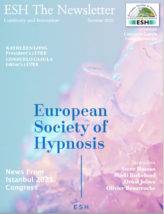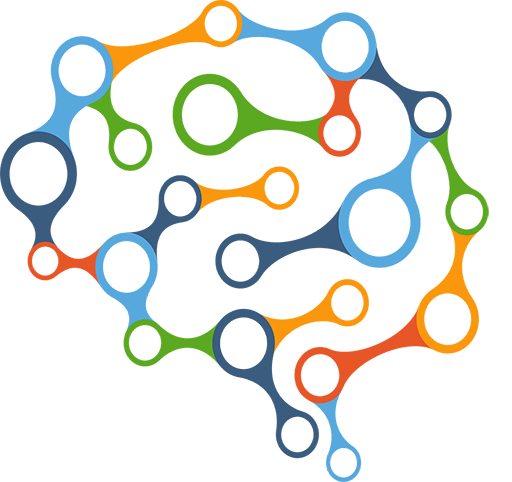
https://esh-hypnosis.eu/wp…/uploads/2022/06/2022-2-2.pdf
Please tell a little about yourself for example interests and family life etc… ?
I was born in 1970 in Nice, I studied and settled in the region. I have always been passionate about philosophy and psychology, and it is quite naturally through my reading that I came to be interested in hypnosis, both with the aim of improving the management of my patients and for my own personal development. I’ve written a book* about it that describes how I see hypnotic modeling as a way to learn and grow. My great passion has always been music and I continue to participate in jazz composition and improvisation projects. I also love to travel, and I had the opportunity to participate in humanitarian and study trips (Peru, Nepal, India), where I learned a lot.
You are the Vice President of Côte d’Azur Hypnosis Academy Society AAH, which is member of the CFHTB. Please tell a little about your Society, members, curriculum, your annual congress.
Founded in 2011 with President Dr Nadine Memran, the Azure Academy of Hypnosis is an association bringing together health professionals around the practice of medical hypnosis in the french riviera. Its purpose is to promote and develop hypnosis in institutions and liberals, to inform in the fields of research and the media, to share experiences and knowledge, and to provide professional training. A.A.H. aims to federate the medical practice of hypnosis, to pool ideas and individual efforts in order to develop a new dynamism in our region, through various initiatives :
– BI-MONTHLY ASSOCIATION MEETINGS : Boards of directors and management., Co-vision and supervision of clinical cases, Thematic presentations to enrich everyone’s reflection and practice, Sharing of knowledge and experiences, Bibliography reviews.
– PRIVATE EVENTS : Reserved for members of the association, on the sidelines of bi-monthly meetings, and organized in the form of : training and experimentation workshops, Seminars with the invitation of a recognized external practitioner, on a theme chosen by the members.
– PUBLIC EVENTS : Popularization and information conferences for caregivers, the media and patients.
– PROFESSIONAL TRAINING : Catalog of generalist and specialized training, initial and continuous, adapted to each specialty.
– POST-TRAINING FOLLOW-UP : Thanks to support of the « companionship » type, the theoretical knowledge is transposed into the clinic, by members who welcome the newly trained within their consultations in hypnosis.
In a way, the COVID pandemic has put these initiatives on hold, and I am in the process of reviving them through the development of my school : OB1 Formations
On a personal level, when and how did you start with hypnosis ?
I have been practicing as a dental surgeon for over twenty-five years. Like many of my colleagues, I have sometimes found myself overwhelmed by certain situations in the firm. Emergency situations, misunderstandings, blockages. With patients sometimes panicked, stressed, aggressive, painful, disinvested, whom I did not necessarily know how to reassure, calm, relieve, or motivate effectively. With the only knowledge from my university studies, mainly focused on the technical side, I felt deprived. I then went in search of integrative solutions. After a few readings on the psychological care of patients, I discovered that hypnotherapy could be a particularly suitable complementary approach. In 2005, I therefore enrolled in the university diploma in medical hypnosis at the Faculty of Medicine of Paris V, at Pitié-Salpêtrière, directed by Doctor Jean-Marc Benhaiem and François Roustang. This marked the beginning of a professional questioning, a profound personal change, and an all-consuming passion for hypnosis, which has never ceased to drive me ever since. I continue to train myself regularly in new approaches, and I have the pleasure of sharing my discoveries as a lecturer and trainer in various private or public institutes (OB1 FORMATIONS, AAH, IFPPC, AFNH, ARCHE, Chrysippe, D.U. medical hypnosis from the faculty of medicine of Nice and Paris XI, D.U. from the faculty of dental surgery of Nice…).
How did you integrate hypnosis in your daily work as a dentist ?
I discovered that the use of medical hypnosis is very different depending on its context of application. For psychologists or psychotherapists in brief therapies or in hypnoanalysis, the Ericksonian approach, slow and progressive, is often suitable. For somatic caregivers, whose main objective is to support an act of care, it is less so. Whether you are a dental surgeon, emergency physician, anesthetist, nurse, caregiver, physiotherapist, osteopath, etc., it is important to have the means at your disposal to support your interventions, in a faster and more efficient way. You have less time to gradually install relaxation, or to develop poetic metaphors. At the bedside of patients who have to undergo a treatment that is sometimes difficult to bear, even if we set ourselves the sole goal of improving their care, the result is often evaluated in a binary mode : comfort, anxiolysis or analgesia are all goals, achieved or not.
Concretely, if conversational hypnosis is an essential basis for the establishment of the therapeutic alliance and of a secure framework, I leaned towards techniques of saturation and interruption of sequence, resulting from direct approaches, and which make it possible to shorten the induction procedure to devote oneself immediately to the accompaniment of the treatment under hypnosis.
Your best experience with a patient and hypnosis ?
As you know, being able to respond favorably to the demand for care in previously inaccessible cases is a daily satisfaction. Being able to perform a complex treatment with the full support of the patient is also a considerable contribution. Although I happened to perform extractions or implantology with hypnoanalgesia alone, this kind of experience, although very demonstrative, cannot claim to be used on a regular basis. I would say that a child who arrives terrified and leaves with a smile, to bring back a drawing to the next session, is always something that touches me.
Any piece of advice for a young dentist just starting to learn hypnosis ?
I would give a paradoxical advice : on the one hand it is first necessary to learn in a good school all the foundations of medical hypnosis, in order to have a good overall understanding and a whole host of techniques. On the other hand, as soon as possible, you have to dare to start and apply it in your practice.
What do you think about The European Society of Hypnosis Certificate ?
A European certificate to validate practitioners is an important step for the official recognition of medical hypnosis and the information and protection of patients.
What do you think about the Research Project of the European Society of Hypnosis ?
I am absolutely passionate about research in hypnosis, especially in neuroscience. I am writing a book – under the direction of Dr. Bruno Suarez – on the extrapolation of neuroscientific data to clinical hypnosis, ie how to move from research to practice. The prodigious development of cerebral imaging over the past twenty years has enabled us to better understand the mechanisms of consciousness and its modifications. The advent of new, even more powerful machines and the pugnacity of researchers promises us many conceptual revolutions in the years to come. Such a research project is essential to share and discuss these developments at a global level.
Which other European Dentist would like to read an interview from in our ESH newsletter ?
I would like to introduce you to a dentist colleague who is doing interesting work on the development of Elmanian hypnosis.
* “La modélisation hypnotique – Réveillez le génie qui dort en vous” – Editions SATAS
